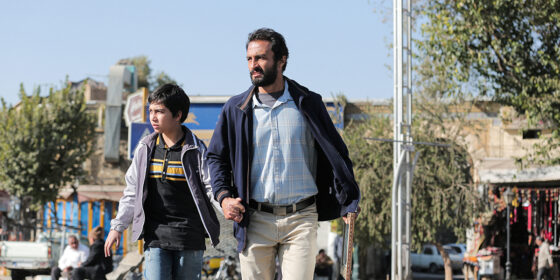TIFF 2021 | A Hero (Asghar Farhadi, Iran)

By Jay Kuehner
An unexpected insight is proffered in Asghar Farhadi’s A Hero by the maligned creditor Bahram, who speculates whether good deeds have become so scarce in society that they warrant congratulation. Much of Farhadi’s moral tale revolves around the appearance of virtue and all of its attendant deceptions, conjuring a very modern anxiety about the power of influence and the hazards of certain fabricated truths. That a simple communal tale set in Shiraz about the consequences of an unpaid debt should resonate so universally is a credit to Farhadi’s carefully calibrated realist satire. Perhaps it likewise deserves mere tacit acknowledgement rather than hyperbole for its efforts.
The opening finds prisoner Rahim, jailed for arrearages and sprung on short release, failing to catch his bus and subsequently arriving, by taxi and then foot, at the colossal tombs of Persepolis (his trailing leg catches just-so on the wire fence as he advances, suggesting greater hobbles to come). Scaling the scaffolded façade with Sisyphean futility, a winded Rahim locates his brother-in-law among the hollows, with whom he takes tea and negotiates a plan to be rid his debt. But how, they muse, did the bereaved of 2,500 years ago make such an ascent to honour their dead? The stark visual and spatial contrast of modern within ancient suggests that Rahim’s conundrum is, in essence, as old as the hills.
With his handsome beard and irrepressible smile, Rahim cuts a rather sympathetic figure for an inmate; his crime forgivable to all but his ex-wife and her father Bahram, their shared acrimony still palpable in the small market stall they keep. Rahim, upon release, plans to marry his new love, and it’s she who furnishes the bounty of gold coins that will serve as currency for his parole. The generous endowment, not worth its weight at market, nevertheless stokes suspicion that Rahim has resorted to thieving. To maintain his innocence, he conspires to have the gold lost, that it might then be miraculously found (at a bus stop, where else), and selflessly returned to a designated owner (tearfully grateful, of course).
The deception proves all too successful, especially as the ´heroic’ deed becomes a cause célèbre and Rahim a model citizen. Ancient Persia was certainly no stranger to avarice, but a more virulent iteration manifests in Fahradi’s reconstructed fable, in which the only imminent death is by character asasination. Ultimately more procedural than allegorical, A Hero digresses somewhat from the promise of its stark conceit, but succeeds in sparing no one its scorn—with the possible exception of Rahim’s son, who’s pawned in the cycle of retaliatory justice but proves that there are limits to the uses to which people might be put. Such limits were once known as principles, the upholding of which may now justify the slightest murmurs of praise.
Jay Kuehner

